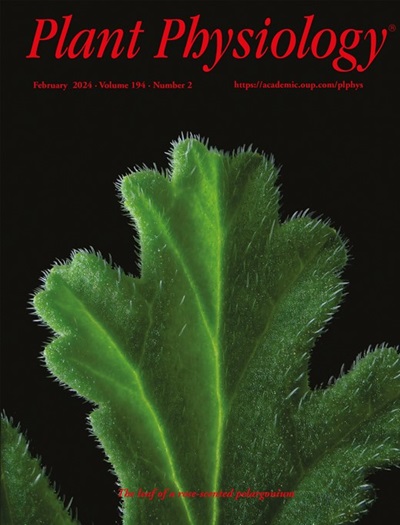两种MYB转录因子相互作用抑制香蕉细胞壁代谢和淀粉降解基因的表达
IF 6.9
1区 生物学
Q1 PLANT SCIENCES
引用次数: 0
摘要
香蕉(Musa acuminata, AAA组)果实软化严重影响采后质量,但控制这一过程的分子调控网络仍不完全清楚。在本研究中,我们发现香蕉和番茄中MaMYB44的过表达延迟了果实硬度损失和淀粉降解。此外,MaMYB44与MaMYB73 (R2R3-MYB转录因子家族的另一成员)相互作用,后者也作为果实硬度损失和淀粉降解的抑制因子。为了阐明这些转录因子的调控网络,我们使用DNA亲和纯化测序(DAP-Seq)进行了全基因组共靶基因分析。结果表明,MaMYB44和MaMYB73共同靶向细胞壁代谢基因扩张蛋白A15 (MaEXPA15)和淀粉降解基因β-淀粉酶3 (MaBAM3)。值得注意的是,MaMYB44和MaMYB73的相互作用增强了它们对MaEXPA15和MaBAM3的结合亲和力和抑制作用。本研究揭示了MaMYB44和MaMYB73形成复合物抑制果实硬度损失和淀粉降解相关基因表达的调控机制。这些研究结果为控制果实软化提供了新的思路,并确定了提高采后品质的重要目标。本文章由计算机程序翻译,如有差异,请以英文原文为准。
Two MYB transcription factors interact to inhibit the expression of cell wall metabolism and starch degradation genes in banana
Banana (Musa acuminata, AAA group) fruit softening severely affects postharvest quality, yet the molecular regulatory networks governing this process remain incompletely understood. In this study, we found that the overexpression of MaMYB44 in bananas and tomatoes delayed fruit firmness loss and starch degradation. In addition, MaMYB44 interacted with MaMYB73 (another member of the R2R3-MYB transcription factor family), which also functioned as a repressor of fruit firmness loss and starch degradation. To elucidate the regulatory network of these transcription factors, we performed a genome-wide co-target gene analysis using DNA affinity purification sequencing (DAP-Seq). The results showed that MaMYB44 and MaMYB73 co-targeted the cell wall metabolism gene expansin A15 (MaEXPA15) and the starch degradation gene β-amylase3 (MaBAM3). Notably, the interaction of MaMYB44 and MaMYB73 enhanced their binding affinity and inhibitory effects on MaEXPA15 and MaBAM3. This study uncovers a regulatory mechanism in which MaMYB44 and MaMYB73 form a complex to inhibit the expression of genes involved in fruit firmness loss and starch degradation. These findings provide perspectives on controlling fruit softening and idenitify important targets for improving postharvest quality.
求助全文
通过发布文献求助,成功后即可免费获取论文全文。
去求助
来源期刊

Plant Physiology
生物-植物科学
CiteScore
12.20
自引率
5.40%
发文量
535
审稿时长
2.3 months
期刊介绍:
Plant Physiology® is a distinguished and highly respected journal with a rich history dating back to its establishment in 1926. It stands as a leading international publication in the field of plant biology, covering a comprehensive range of topics from the molecular and structural aspects of plant life to systems biology and ecophysiology. Recognized as the most highly cited journal in plant sciences, Plant Physiology® is a testament to its commitment to excellence and the dissemination of groundbreaking research.
As the official publication of the American Society of Plant Biologists, Plant Physiology® upholds rigorous peer-review standards, ensuring that the scientific community receives the highest quality research. The journal releases 12 issues annually, providing a steady stream of new findings and insights to its readership.
 求助内容:
求助内容: 应助结果提醒方式:
应助结果提醒方式:


